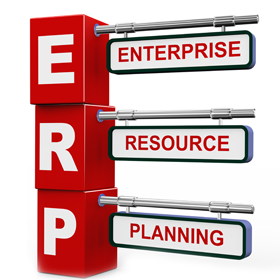Overview
ERP (enterprise resource planning) is an industry term for the broad set of activities that helps a business manage the important parts of its business. The information made available through an ERP system provides visibility for key performance indicators (KPIs) required for meeting corporate objectives. ERP software applications can be used to manage product planning, parts purchasing, inventories, interacting with suppliers, providing customer service, and tracking orders. ERP can also include application modules for the finance and human resources aspects of a business. Typically, an ERP system uses or is integrated with a relational database system.
How can ERP improve a company’s business performance?
ERP’s best hope for demonstrating value is as a sort of battering ram for improving the way your company takes a customer order and processes it into an invoice and revenue—otherwise known as the order fulfillment process. That is why ERP is often referred to as back-office software. It doesn’t handle the up-front selling process (although most ERP vendors have developed CRM software or acquired pure-play CRM providers that can do this); rather, ERP takes a customer order and provides a software road map for automating the different steps along the path to fulfilling it. When a customer service representative enters a customer order into an ERP system, he has all the information necessary to complete the order (the customer’s credit rating and order history from the finance module, the company’s inventory levels from the warehouse module and the shipping dock’s trucking schedule from the logistics module, for example).
People in these different departments all see the same information and can update it. When one department finishes with the order it is automatically routed via the ERP system to the next department. To find out where the order is at any point, you need only log in to the ERP system and track it down. With luck, the order process moves like a bolt of lightning through the organization, and customers get their orders faster and with fewer errors than before. ERP can apply that same magic to the other major business processes, such as employee benefits or financial reporting.
ERP Software Development in India - We offer ERP solutions and packages to organizations across domains:
A ERP business management solution that integrates all facets of a business - Planning, Finance, Materials, Sales, Marketing, Manufacturing, Human Resources etc. ERP solution boosts productivity, connectivity and business insight for small and medium-sized companies in a cost-effective way.
Our mcRAv ERP Solutions, ERP process manufacturing software, CRM ERP software, Business ERP software & Production ERP software - helps you concentrate on business by keeping track of Revenue cycles, Purchase cycle etc.
- Helps you plan the business activities by giving you clear view from any angle.
- It can connect your every business premises and give you consolidated view.
- It can give you critical information instantly wherever you are through e-mail and SMS.
- Helps you efficiently manage Man Power, Money flow, Stock and Machinery


We are give the microfinance modules
- Purchase Management
- Sales Management
- Inventory Management
- Product Management
- Finance Management
- Distribution Management
- Reporting Management
- Customer Relation Management
- Human Resources
- Shipping Management
- Marketing Management
if Buy Enterprise Resource Planning (ERP): Click here to contact sales team